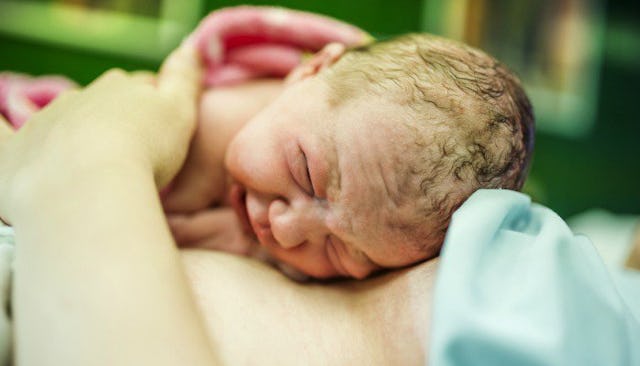Why I Stopped Telling My Friends That Natural Birth Hurts Like Hell

My second birth was so fast I did not have time for an epidural—and it was excruciating. I had been banking on a repeat of my first birth—that bearable drug-calmed delivery, but I was a fool. “Man plans and God laughs,” the Yiddish saying goes, only it felt more like “woman plans and God cracks up and rolls around on the floor holding his guts.”
How could I know that the seven hours it took my body to prepare to push with my first child would be an expedited two with my second? Not only that, but it was ill-timed to coincide with a change of shifts, so by the time the fresh midwife took over, I had passed the “Jesus, this bloody hurts—get me an epidural now!” stage and was into the “Aaaaahhhhh, it’s coming out!” phase.
The pain invaded my body in rapid, hot, alien waves of suffering that had me screaming so loud even the midwife lost her cool. “You’re going to have one hell of a sore throat tomorrow if you keep on screaming like that,” I remember her snapping at me. “Pull yourself together and start pushing.”
After giving birth, I shook for two hours from the physical and emotional impact of that express delivery. I felt victimized by my own body and shocked and traumatized by the pain. Contrary to popular myth, I didn’t forget the suffering the moment that cocoon-wrapped little bundle was placed into my arms. In fact, it was hard for me to hold my daughter afterward. I did, but it was not warm and rosy, it was “Hello darling, lovely to meet you. What was the freaking rush? Go to your dad now, and give me a moment, or two hundred, to get a grip.”
For a long time after the birth, I felt it was part of my duty of the sisterhood of mothers to let soon-to-be-mom friends know that natural birth hurts—a lot! “Just be aware that it really freaking hurts,” I told them. I wanted them to make informed decisions based on their own ability to withstand pain, but also based on truth and not rosy earth-mother type fantasies.
Then someone I had previously warned gave birth naturally, quick and unplanned, much in the same way I had, and it didn’t hurt. WTF?
Maybe because her baby was small.
Maybe because her vagina was big.
Maybe because her pain threshold was higher than mine.
Maybe because her adaptability to stress was quicker.
Maybe because her expectations were different than mine.
Secretly, I wanted to believe that she was in post-birth euphoric pain denial. That would be much easier to stomach than to wonder if she had just proved what a big wimp I was, or to admit that what happens on the delivery table is as randomly kind or unkind as much as life seems to be.
The truth is, when I heard her story, I knew it was time to shut the hell up. What’s the point of scaring optimistic birth plan and doula enthusiasts with my stormy weather warning when everyone’s experience is unique? Does knowing it will be painful actually help anyone, or only cause more stress?
The truth is, no two births are alike—ask any mother. We come to each birth in a different state of readiness, with different expectations and different bodies. We could be early or overdue, tired or energized, feeling anticipation or dread. All of these factors will affect our ability to ride the pain and have the birth that we want. Let’s face it: Mother Nature likes to surprise us, too.
That birth was a while ago. I still remember the experience and the emotions, but have forgotten the intensity of the pain. Now when I encounter a woman about to give birth, I listen with interest and empathy. Then I wish her good luck and a smooth delivery, knowing that the most important thing of all is that both mother and child will be safe. And that the memory of the pain will soon be overlaid with other precious and monumental recollections.